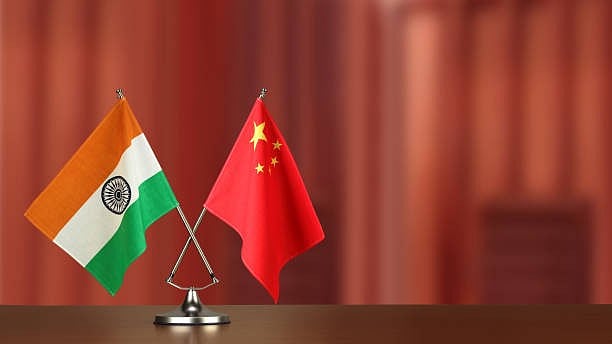
The flags of India and China. (For representation)
Credit: iStock Photo
New Delhi: With Foreign Secretary Vikram Misri in Beijing to restart talks at the top diplomats' level between India and China, New Delhi is likely to seek an early renewal of bilateral agreements with the communist country for the sharing of hydrological data on transboundary rivers Brahmaputra (Yarlung Tsangpo) and Sutlej (Langqên Tsangpo).
He will reiterate New Delhi’s concerns over Beijing’s move to build a mega hydropower plant on Yarlung Tsangpo river in the Tibet Autonomous Region of China – a project which might result in a diminishing flow of water into Siang and Brahmaputra in India.
He will also stress on an early meeting of hydrological experts of the two nations within the framework of a mechanism set up in 2006. New Delhi expects that the meeting of the hydrological experts will help it elicit more details from Beijing about the nature of the project planned on Yarlung Tsangpo, a source aware of frameworks of India-China engagements on transboundary rivers told DH.
Misri had a meeting with Liu Jianchao, the head of the international department of the Communist Party of China Central Committee, soon after arriving in Beijing on Sunday. He is likely to meet Chinese Vice Foreign Minister Chen Xiaodong during his two-day visit to Beijing. They will discuss the “next steps for India-China relations, including in the political, economic, and people-to-people domains,” according to the Ministry of External Affairs in New Delhi.
They will also discuss resumption of direct flights between Indian and Chinese cities, exchange of journalists and easing of issuance of visas. The resumption of Kailash Mansarovar Yatra will also figure prominently in the meeting between Misri and Chen.
The meeting between the top diplomats of the two nations is one of the several bilateral mechanisms for dialogue disrupted due to the India-China military stand-off, which started along the Line of Actual Control in eastern Ladakh in April-May 2020 and continued till October 2024, bringing bilateral relations to a new low.
The stand-off formally ended with the Indian Army and the Chinese People’s Liberation Army on October 21 agreeing upon a patrolling arrangement for Depsang and Demchok areas – the last two face-off points along the LAC to be resolved. Two days later, Prime Minister Narendra Modi and Chinese President Xi Jinping had a bilateral meeting – first in five years – on the sideline of the BRICS summit at Kazan in Russia and agreed to restart not only boundary negotiations by the special representatives of the two governments, but also regular dialogues at the level of foreign minister and top diplomats.
Though the Modi-Xi meeting marked a thaw, a new irritant emerged last month with Beijing deciding to go ahead with its plan to build the hydroelectric project on Yarlung Tsangpo. New Delhi stressed in diplomatic contacts with Beijing that the interests of downstream states should not be harmed by activities in upstream areas of Yarlung Tsangpo, known as Siang and Brahmaputra in Arunachal Pradesh and Assam.
India and China do not have an agreement for sharing of water of transboundary rivers. The two nations had in 2002 and 2005 inked two MoUs, creating frameworks for China to share with India hydrological information during monsoon seasons on Yarlung Tsangpo (Brahmaputra/ Siang) and Langqên Tsangpo (Sutlej) respectively. The two MoUs could not be renewed after they expired – one on Sutlej in 2020 and the other on Brahmaputra in 2023 – due to the strains in ties over the military stand-off along the LAC.
Misri will stress on the early renewal of the two MoUs during his meeting with Chen.
He is also expected to underline that a 2013 MoU had both China and India recognizing that transboundary rivers and related natural resources and the environment were “assets of immense value to the socio-economic development of all riparian countries”. He is likely to underline that India, being a lower riparian nation with established user rights over the waters of Siang/Brahmaputra, remains concerned over the proposed hydroelectric project conceived by China on Yarlung Tsangpo.
